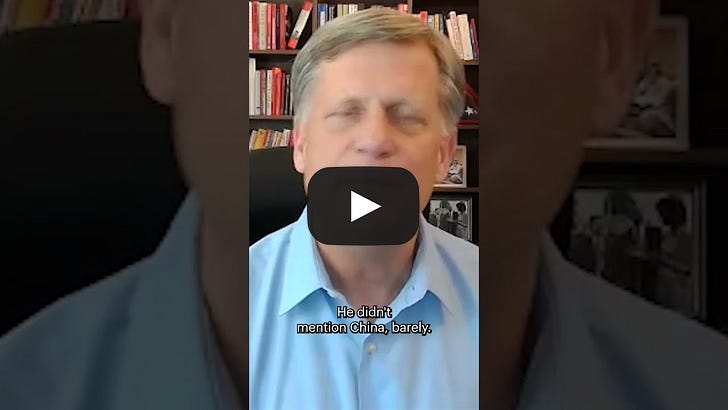Britain Enters Orwell’s 1984 Thought Police State

BY MATT TAIBBI Racket News | September 5th, 2025
On Tuesday morning, a day after Father Ted writer and comedian Graham Linehan was arrested at Heathrow airport for three tweets deemed transphobic, I spoke with Freddie Sayers of the U.K.-based Unherd, in an interview released yesterday. For the unfamiliar, Unherd has been a stalwart, often lonely defender of free expression in a post-Brexit era that saw significant shifts in British attitudes. Freddie’s site responded to the Linehan story in characteristic fashion: “The Shameful Arrest of Graham Linehan.”
In the last year, Unherd has become more pessimistic about unfettered free speech. There’s been backlash to criticism from America about British regulation, particularly as expressed by Elon Musk and his supporters on X/Twitter. Through voices like Richard Hanania and the always-interesting Malcolm Kyeyune, Unherd has devoted a lot of space to decrying Musk’s actions with DOGE, and what it sees as a too-unchecked flow of falsehoods on X.
I have my own documented issues with Musk and often roll eyes at his leap-before-you-look tweets, though many of the supposedly “terrible” things he’s said just strike me as funny (e.g. a picture of Bill Gates under the tweet, “in case u need to lose a boner fast”). As noted in the friendly interview above, when asked to choose between a British government that arrests citizens for tweets and has an Online Safety Act that empowers the state with broad control over Internet content, I have to side with Musk.
He certainly has reasons to be upset with Britain and the EU, which are both threatening crippling penalties for refusing to obey content dictates. As Paul Thacker and I also reported last year, the Labour-aligned Center for Countering Digital Hate listed “Kill Musk’s Twitter” as a top organizational goal in leaked documents:
When Freddie referred to Musk’s Twitter as a “cesspit,” I had a flashback. It’s forgotten, but the digital censorship era began with two electoral results. First after Brexit in June 2016, then after Donald Trump’s election in November that same year, it became instant conventional wisdom that “disinformation” on social media was responsible. When Trump was elected, Twitter — not Elon Musk’s Twitter but Jack Dorsey’s Twitter, proto-BlueSky Twitter — was deemed a “cesspool for disinformation” by the New York Times. Public panic reached such a pitch that within a year Twitter, Facebook, and Google were dragged to the Hill and forced under the threat of increased regulation to come up with plans to combat “discord” and disinformation, birthing public-private censorship.
Twitter and Facebook, previously praised as a lubricant for aiding Barack Obama’s victories (“The First Social Media President!” the Seattle Times gushed), were now regularly denounced as “cesspools” of “fake news,” bigotry, and anti-Semitism. The pattern would repeat across multiple issues (Covid, J6, Ukraine, Gaza), inspiring more draconian responses, from Trump’s social media ban to suppression of content promoting “vaccine hesitancy.” In America heavy-handed digital measures helped re-elect Trump. In Europe, the specter of Brexit, Trump, Viktor Orban, and other movements led to full-service censorship laws like the Digital Services Act.
It’s a chicken-egg question. Did a dangerous xenophobic nationalism necessitate state intervention, or did an authoritarian political establishment inspire the nationalist revolt? The U.S. under Trump and J.D. Vance since last year’s election formally accused Europe and Britain of undermining democracy, while our ex-Atlantic partners accuse us of stirring up nationalist violence, with Musk becoming a villain of almost Hitlerian sweep in Britain. Who’s right? Freddie posed some of these worries in an earlier talk with Claire Lehman of Australia’s Quillette, but my American answer is that Europe started it:
I decided to speak at the “Rescue the Republic” MAHA event last fall, and center the address on the uniqueness of the American speech tradition and why it needed protecting, mainly because of material found in the Twitter Files.
If you’ve read Racket’s timeline on the subject, you know American firms like Facebook, Google, Microsoft, and Twitter were first asked to aceept “voluntary” content monitoring by European authorities in mid-2016, after terror attacks in Paris and Brussels. We saw in Twitter’s Files that the company was sufficiently concerned about these developments to hire “counterspeech” experts to lobby lawmakers on both sides of the Atlantic on the idea that more and better speech, not censorship, was the right policy answer.
In Europe, they failed. The 2017 passage of Germany’s NetzDG and the 2018 addition of Europe’s Code of Practice on Disinformation in the wake of the Cambridge Analytica scandal enmeshed American companies early on in a series of agreements that forced them to expend significant resources to prove compliance by broadening content moderation programs.
There have repeated efforts to pass American laws to match Europe’s, an example being the 2020 “COVID–19 Disinformation Research and Reporting Act of 2020.” New York Times reporter Cecelia Kang went on CBS to complain that our “thorniest” problem was “we have in our law… the First Amendment,” and “have to abide by really our constitutional limits,” while the “United Kingdom, Germany, New Zealand, Australia [and] India” could be more proactive about Covid “misinformation.” That law failed. The Biden administration’s 2022 effort to institute a “Disinformation Governance Board” via the authority of the Department of Homeland Security also failed, following a backlash.
We saw in Twitter Files that during this time, frustrated American and European officials were discussing the possibility of the U.S. either independently adopting European-style speech concepts, or folding the U.S. into EU laws like the Digital Services Act. One EU parliamentary report written after Joe Biden’s election and discussed internally at Twitter was titled, “Harnessing the new momentum in transatlantic relations: Potential areas for common action during the Biden presidency.” It suggested the U.S. could seek “inspiration from the EU’s Code of Practice on Disinformation” and enforce speech rules through the authority of the Federal Trade Commission, bypassing Congress:
This dovetailed with other material, like an Aspen Institute proposal for funding a “capacity-building” bureaucracy for “misinformation countermeasures” through “FTC fines.” The Institute also pushed an international “cross-platform database” of speech offenders. A report by Twitter’s lobbying firm after January 6th even described how “exasperated” members of Congress on the Hill were, suggesting the U.S. needed to “follow in the footsteps of Europe.” Another summary by a Twitter political advisory firm described hearing officials and executives “bemoaning of the limitations placed on the government as a result of the First Amendment.”
Seeing John Kerry last fall talk to the WEF about the difficulty the First Amendment posed in “hammering [disinformation] out of existence” heightened worries. The one thing everyone in the “anti-disinformation” universe seemed to agree on is that the First Amendment was a unique pain in the ass of global enforcement.
There was nothing in Trump’s history to suggest he would be any kind of free speech champion, but by last summer the Democrats’ repeated efforts to institute European-style speech codes made future prospects under Kamala Harris look not so hot. During the Harris run Democrats aligned with a French government that arrested Signal CEO Pavel Durov, and accepted campaign assistance from the Labour Party of Starmer as the latter was promising to accelerate speech enforcement and even deploy “preventive action” in the mold of Minority Report.
So long as First Amendment survived as a turd in the international censorship punchbowl, the worst possible outcome was two bad speech regimes, which would always be better than one big, globally integrated one. That was my thinking heading into last year’s “Rescue the Republic” event, anyway.
After the election there were a few positives (the dismantling of the Global Engagement Center, bringing victims of censorship like Jay Bhattacharya into senior positions, appearing to support Meta/X/Google etc in efforts to resist foreign speech codes) but also clear bad signs (Marco Rubio using AI to scan social media of legal visitors, having the head of X in a high quasi-state position, etc). When J.D. Vance gave a speech in Munich denouncing Europe’s move toward arrests for speech and even overturned elections, it was notable that U.S. media figures as well as Democratic Party officials went on air to declare themselves shocked, shocked by objections to European laws. In the interview below, Katie Couric — co-chair of the Aspen Institute Commission on Information Disorder that wrote a report suggesting reforms that would “align” with the DSA — interviewed former Ambassador to Russia Michael McFaul, about the collapse of the Transatlantic Partnership:
What’s happened since has been predictable. The Trump administration’s most troubling speech decisions have been in service of a nationalist policy, while Britain and Europe have continued using speech laws to crack down on nationalism.
When Turkish Tufts student Rümeysa Öztürk was detained on March 25th, press and academia in America plunged into a panic. This was a doctoral student on a legal visa, whose only apparent offense was authorship of an editorial in Tufts Daily demanding the school “acknowledge the Palestinian genocide.” A government that will detain a legal resident for a tepid editorial like Öztürk’s probably isn’t bothered by the the idea of arrests for speech in general, which is why the Foundation for Individual Rights and Expression (FIRE) was right to sue and force the courts to decide if immigration law trumps the First Amendment.
Still, the American media response was remarkable. The surveillance footage showing Öztürk’s arrest went viral, leading to commentary that used words like “kidnap” or “abduct” or “snatched” to describe her detention, and that of Columbia student Mahmoud Khalil. Meanwhile, the Times UK on April 4th came out with a story headlined, “Police make 30 arrests a day for offensive online messages.” The paper of record in Britain wrote:
Custody data obtained by The Times shows that officers are making about 12,000 arrests a year under section 127 of the Communications Act 2003 and section 1 of the Malicious Communications Act 1988…
The paper showed the number of speech arrests more than doubled annually since 2017. American and British commentators have since downplayed the numbers.
My own former Rolling Stone in its story about Linehan worried more about the “backlash” to European speech laws than it did about Linehan, who was denounced as a reactionary. “Not the only middle-aged celebrity to pivot to transphobia,” quipped the mag. They also noted that “fewer than 10 percent” of England’s 30 daily arrests resulted in sentencing, and some of those sentenced, the erstwhile countercultural magazine pointed out, included “individuals who incited racial hatred on social media during the U.K.’s anti-immigrant riots last summer,” which was “violence that [Elon] Musk helped to fuel.”
The BBC similarly wondered what Musk’s “curious fixation” was with Britain, noting that one of the 30-odd daily arrests in England ended in “a three-month jail sentence for a person who posted a meme along with the caption ‘let’s [expletive] riot’” last year. British state media could equally have cited a case of 40-year-old David Wootton, convicted for going to a Halloween party dressed as suicide bomber Salman Abedi, or the Derbyshire student who called someone a “Polish twat,” or the Bedfordshire resident arrested for saying being “pansexual” was “not a thing,” or dozens of other preposterous cases. There haven’t been releases of scary surveillance video of “kidnapped” Halloween partiers, which makes one wonder why the American press is willing to embrace Khalil as a speech martyr but not Julian Assange or Linehan or the retired German army sergeant arrested for calling Vice Chancellor Robert Habeck a Schwachkopf, which apparently translates as “dunderhead” or “moron.” In the U.K., these dumb arrests are inevitable because the law under which Linehan was detained, for instance, is based on whether or not the complainant felt “alarm” or “abuse.” Like many American campus speech codes, it’s a harm standard where injury doesn’t have to be proven, just asserted. Instituting a criminal law in the U.S. using that concept would be a radical step for us, but less so in Europe, which has been moving in that direction for a while.
Given the pattern of tightening enforcement following each controversial election, a guess is Europe’s present is America’s ghost of Christmas future. That doesn’t mean allowing Trump to ride roughshod over the Constitution, but there’s reason to see conflict between the former allies as a positive. So long as they’re not uniting to sideline the “thorny” First Amendment, we’ll remain a step removed from the worst-case scenario, which looked pretty possible if not likely a year ago. Or are we overhyping the dystopian character of Europe’s new laws? Comments from Racket’s European readers are welcome. In the meantime, thanks to Freddie and Unherd, and let’s hope our two countries are not locked together in a downward spiral.










